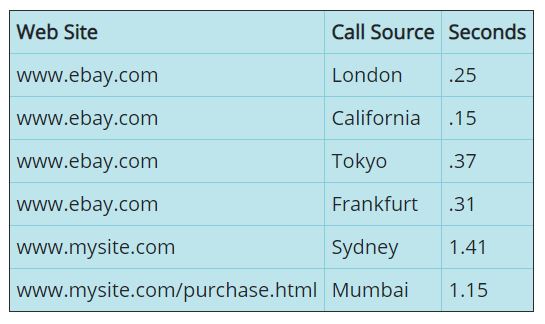Measuring Web Page Load Speed from Points Around the Globe with an API Call
Posted on July 15th, 2019

If you are open for business internationally, you will want to make sure your Web site performs well globally, as slow Web sites and sluggish page loads can cost you Web traffic. One way to address the issue is utilizing "edge" sites that can cache copies of your Web site content to physical servers in different places around the world. This reduces the distance the content must travel from server to browser, thereby reducing page load time. There are several edge computing content delivery networks such as AWS Cloudfront, Microsoft's Azure Edge products, Clearblade, Fastly, and Rigado, as well as several others, that can help you achieve this. But how do you measure the effectiveness of these solutions in various global locations to ensure your edge computing investments are paying off? How do you ensure international site visitors aren't turned off by delays in page loading?
Interzoid's Global Page Load API allows location-based, real-time performance monitoring of Web pages and other Internet-assets with an easy-to-use API call. Simply provide the desired source calling location as a parameter value (Paris, Tokyo, Sydney, Frankfurt, San Francisco, Mumbai, Singapore, etc.) along with the target page's URL to the API function. The mechanism behind the API will simulate a browser load of the page from the specified geography using a server physically located there. It will then return a measured value of the amount of time elapsed for the site to respond and load. This works for any page or asset on a Web site including non-visual components such as an API. This allows pinpointing of any slow-performing portions of a Web site, especially when the entire site is tested URL by URL.
In addition, you can use a scheduler or other time interval trigger to automate performance-measuring tasks from diverse locations such as calling the API hourly, every fifteen minutes, every sixty seconds, or whatever makes sense for your requirements. This enables continuous performance monitoring and reliability testing from all over the world, ensuring end-user actions are responded to quickly everywhere and investments such as edge computing are producing dividends. It also allows for automated notification of I.T. staff if there is a slow response or a deteriorating performance scenario. The API approach allows complete customization of business processes around these automated performance tests.
Example results:

With Interzoid's easy-to-integrate API interface and usage-based business model, you can get up and running with a global Web performance monitoring solution fast, and of course only pay for what you use. This enables you to start out small, and then decrease the time intervals and page coverage as you experience success. There are current testing locations available and accessible through the API in California, Frankfurt, Hong Kong, London, Montreal, Mumbai, Paris, Sao Paulo, Singapore, Stockholm, Sydney, Tokyo, and Virginia.
AI Interactive Data Client: Request and Receive Structured Data of Any Kind on Any Subject.
More...
Github Code Examples
More...
Generate your own Datasets: Retrieve Customized, Real-World Data on Demand as Defined by You
More...
High-Performance Batch Processing: Call our APIs with Text Files as Input.
More...
Try our Pay-as-you-Go Option
More...
Available in the AWS Marketplace.
More...
Free Trial Usage Credits
Check out our full list of AI-powered APIs
More...
Documentation and Overview
More...
Product Newsletter
More...